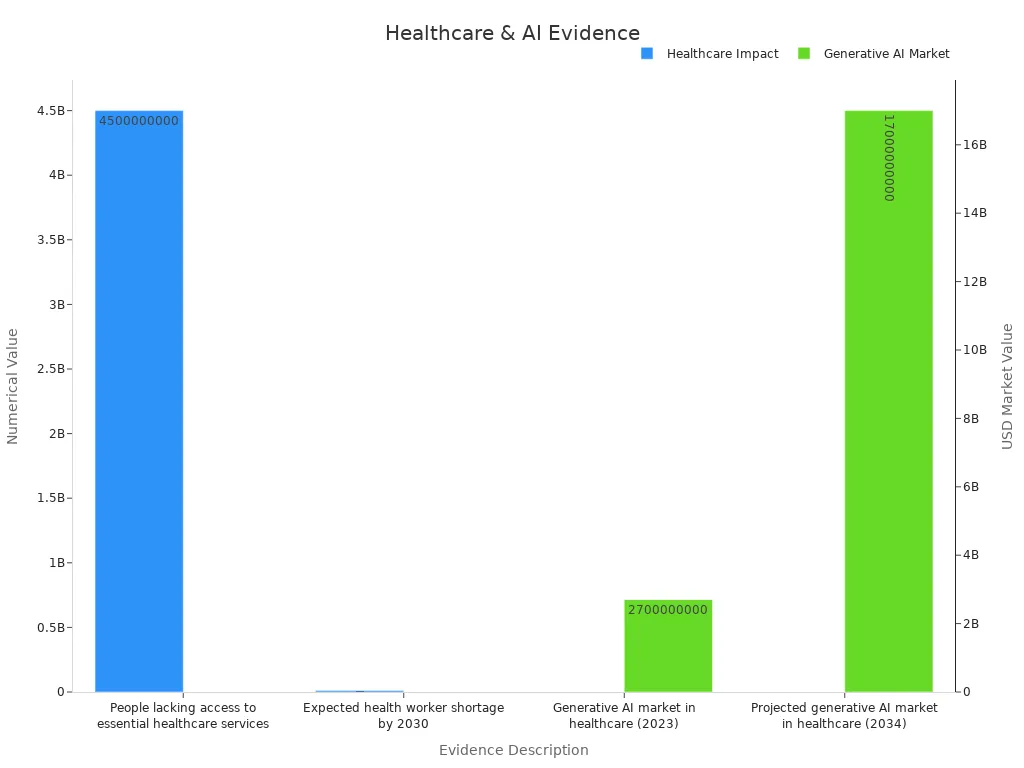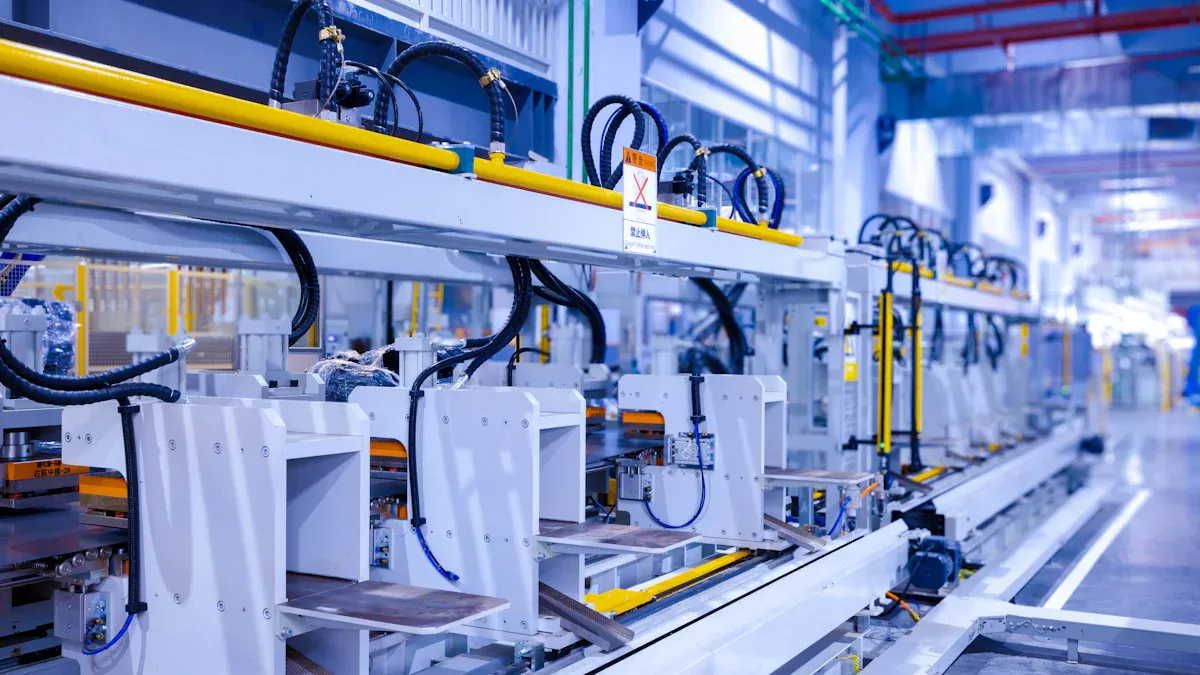
AI platforms are changing the way industries operate. You’ve likely noticed how technology is reshaping everything—from how businesses predict trends to how they improve customer experiences. Did you know roughly 55% of finance teams already use AI for data analysis? Plus, AI is expected to contribute $15.7 trillion to the global economy by 2030. That’s not just innovation; it’s a revolution.
Key Takeaways
-
AI tools like OpenAI and Google Cloud AI are changing industries.
-
Companies use AI to make customers happier and work faster.
-
Using AI can save money and boost the economy a lot.
-
Experts say AI might add trillions of dollars by 2030.
OpenAI: Transforming Healthcare and Customer Service

Core Features
OpenAI's advanced language models, like GPT-4, are at the forefront of innovation. These models excel in natural language understanding, enabling them to process and generate human-like text. They can analyze vast datasets, provide accurate predictions, and adapt to various contexts. For instance, GPT-4.1 nano outperforms earlier versions in tailored communication and completeness, making it a reliable tool for complex tasks.
|
Model |
Overall Score |
Emergency Referrals |
Tailored Communication |
Completeness |
|---|---|---|---|---|
|
GPT-3.5 |
16% |
Strength |
Weakness |
Moderate |
|
GPT-4o |
32% |
Strength |
Moderate |
Moderate |
|
o3 |
60% |
Strength |
Moderate |
Strong |
|
GPT-4.1 nano |
Strength |
Moderate |
Strong |
These capabilities make OpenAI a game-changer in industries that rely on precise communication and data-driven insights.
Industry Applications
In healthcare, OpenAI is tackling some of the biggest challenges. Did you know 4.5 billion people lack access to essential healthcare services? OpenAI helps bridge this gap by powering virtual assistants that engage with patients, generating clinical notes, and even assisting in symptom diagnosis. It also supports mental health counseling and medication management.
In customer service, OpenAI enhances chatbots to deliver personalized and efficient responses. It enables businesses to provide 24/7 support, improving customer satisfaction. Whether it's answering medical queries or simplifying insurance claims, OpenAI's applications are diverse and impactful.

Benefits and Use Cases
OpenAI's contributions lead to tangible benefits. In healthcare, it simplifies medical documentation, saving time for professionals. It also improves patient education by providing clear explanations of complex topics. For example, AI-powered dashboards allow doctors to monitor patients in real-time, ensuring timely interventions.
In customer service, OpenAI reduces response times and enhances user experiences. It’s particularly effective in multilingual support, adapting content for diverse populations. By automating repetitive tasks, businesses can focus on strategic growth.
With AI platforms like OpenAI, industries are not just keeping up—they’re setting new standards for innovation and efficiency.
Google Cloud AI: Revolutionizing Retail and Manufacturing
Core Features
Google Cloud AI offers a suite of tools designed to harness the power of artificial intelligence for businesses. Its Vertex AI platform simplifies the process of building, deploying, and scaling machine learning models. You can use pre-trained models or customize them to meet your specific needs. The platform also integrates seamlessly with big data analytics, enabling real-time insights and predictive modeling.
Another standout feature is its ability to process vast amounts of unstructured data, such as customer reviews or factory sensor readings. This capability allows businesses to uncover trends and make data-driven decisions faster. With tools like AutoML and AI-powered APIs, Google Cloud AI empowers you to innovate without needing extensive technical expertise.
Industry Applications
Google Cloud AI is making waves in both retail and manufacturing. In retail, companies like McDonald’s and Mercado Libre are leveraging AI for digital transformation. McDonald’s uses AI and edge computing to enhance operations and improve customer experiences. Mercado Libre, on the other hand, employs Vertex AI Search to optimize product discovery for over 100 million customers.
In manufacturing, Google Cloud AI collaborates with firms like GFT to develop factory optimization solutions. These applications focus on improving efficiency and upskilling workers. By integrating generative AI, manufacturers are moving beyond the hype to practical, impactful solutions.
|
Industry |
Company |
Application |
Impact |
|---|---|---|---|
|
Retail |
McDonald’s |
Digital transformation with AI |
Enhanced operations and customer experience |
|
Retail |
Mercado Libre |
Vertex AI Search for product discovery |
Increased revenue for 100 million customers |
|
Manufacturing |
GFT |
Factory optimization with AI |
Improved efficiency and up-skilled workers |
Benefits and Use Cases
Google Cloud AI delivers measurable outcomes across its applied sectors. In retail, it enhances customer engagement through personalized recommendations, leading to higher satisfaction and retention rates. For example, AI-driven demand forecasting helps businesses allocate inventory more effectively, reducing waste and improving supply chain agility.
In manufacturing, the platform excels in quality control by using advanced image recognition to detect defects. This reduces waste and ensures higher product quality. Additionally, real-time threat detection and compliance reporting enhance data security, giving businesses peace of mind.
Whether you’re in retail or manufacturing, Google Cloud AI provides the tools you need to stay competitive. It’s not just about keeping up—it’s about leading the way in innovation.
IBM Watson: Innovating Education and Logistics
Core Features
IBM Watson stands out for its ability to process vast amounts of structured and unstructured data. Its AI-powered tools, like Watson Discovery and Watson Assistant, help you uncover insights and automate workflows. These tools use natural language processing (NLP) to understand complex queries and provide accurate responses. Watson also integrates seamlessly with existing systems, making it easy to adopt without overhauling your infrastructure.
One of its most impressive features is the IBM Cognitive Supply Chain Advisor 360. This tool gives you real-time visibility into supply chain operations. It predicts demand changes and helps you respond quickly, reducing costs and improving customer satisfaction.
With IBM Watson, you can transform data into actionable insights, whether you're managing logistics or enhancing education.
Industry Applications
IBM Watson is making waves in education and logistics. In education, it analyzes students’ learning patterns and preferences. This allows you to adapt content to individual needs, creating personalized learning experiences. Coursera uses Watson to improve student engagement and outcomes.
In logistics, Watson powers autonomous vehicles and predicts demand fluctuations. FedEx leverages its AI capabilities for smart package sorting and tracking, automating processes in distribution centers.
|
Industry |
Application Description |
|---|---|
|
Education |
AI analyzes students’ learning patterns and preferences, adapting content to individual needs for effective learning experiences. |
|
|
Coursera uses AI for personalized learning experiences, improving student engagement and outcomes. |
|
Logistics |
AI powers autonomous vehicles and predicts demand fluctuations, helping supply chain actors reduce costs and speed up deliveries. |
|
|
FedEx leverages AI for smart package sorting and tracking, automating the sorting process in distribution centers. |
Benefits and Use Cases
IBM Watson delivers measurable results across industries. In education, it reduces the summer melt rate from 20% to just 1%, ensuring more students enroll in college. It also boosts overall enrollment rates by 4%, generating millions in revenue for institutions. Students report an 85% satisfaction rating, highlighting the positive impact of personalized learning.
In logistics, Watson enhances supply chain efficiency. Its real-time visibility tools improve responsiveness to demand changes, cutting costs and enhancing team experiences. Autonomous vehicles powered by Watson speed up deliveries, while smart sorting systems reduce errors and save time.
|
Metric |
Before Implementation |
After Implementation |
Improvement |
|---|---|---|---|
|
Summer Melt Rate |
20% |
1% |
Reduced by 19% |
|
Overall Enrollment Rate |
N/A |
4% increase |
Millions in revenue |
|
Student Satisfaction Rating |
N/A |
85% |
Positive feedback |
With IBM Watson, you’re not just adopting AI—you’re driving innovation in education and logistics.
Microsoft Azure AI: Advancing Energy and Entertainment
Core Features
Microsoft Azure AI offers a robust suite of tools designed to help you tackle complex challenges in energy and entertainment. Its pre-built AI models and customizable machine learning capabilities make it easy to deploy solutions tailored to your needs. Azure Cognitive Services stands out for its ability to process natural language, analyze images, and even translate speech in real time.
Another key feature is Azure Machine Learning, which simplifies the creation and deployment of predictive models. You can use it to analyze massive datasets and uncover actionable insights. Azure AI also integrates seamlessly with Microsoft 365 Copilot, enabling automation and boosting productivity across industries.
With Azure AI, you don’t just adopt technology—you unlock new possibilities for innovation and efficiency.
Industry Applications
Azure AI is making a significant impact in energy and entertainment. In the energy sector, companies like New Sun Road use Azure AI to optimize renewable energy systems, ensuring efficient load management. MAIRE leverages Microsoft 365 Copilot to save 800 working hours per month while reducing its carbon footprint.
In entertainment, Azure AI powers real-time content personalization. Streaming platforms use its sentiment analysis tools to recommend shows based on your preferences. Game developers rely on Azure’s real-time object detection to create immersive experiences.
|
Company |
Implementation |
Impact |
|---|---|---|
|
New Sun Road |
AI for energy systems |
Optimized loads for renewable energy deployment |
|
MAIRE |
Microsoft 365 Copilot |
Saved 800 working hours/month, reduced carbon footprint |
|
Emirates Global Aluminum |
Azure Local for digital manufacturing |
10-13x faster AI response time, 86% cost savings |
Benefits and Use Cases
Azure AI delivers measurable benefits across industries. A Forrester study revealed that organizations using Azure AI achieved $31.5 million in benefits over three years, with a net ROI of 284%. This demonstrates its economic value and efficiency.
Here are some practical use cases:
-
Text Summarization: Quickly condense lengthy documents for easier decision-making.
-
Sentiment Analysis: Understand public opinion through social media and feedback.
-
Real-Time Object Detection: Enhance security or retail operations by identifying objects instantly.
-
Customer Churn Prediction: Retain at-risk customers with proactive strategies.
Whether you’re optimizing energy systems or creating engaging entertainment experiences, Azure AI empowers you to lead in innovation. It’s not just about keeping up—it’s about staying ahead.
NVIDIA AI: Transforming Agriculture and Transportation

Core Features
NVIDIA AI is at the forefront of innovation, offering powerful tools that are reshaping agriculture and transportation. Its advanced GPUs and deep learning frameworks enable real-time data processing and decision-making. For example, connected machines powered by NVIDIA GPUs can analyze data every 20–80 seconds, allowing autonomous systems to make smarter decisions. Technologies like the See & Spray system use deep learning and computer vision to optimize farming practices, such as precision herbicide application. This reduces chemical usage and boosts crop yields.
In transportation, NVIDIA’s DRIVE platform is revolutionizing autonomous vehicles. It combines AI-powered perception, mapping, and decision-making to create safer and more efficient transportation systems. These features make NVIDIA AI a game-changer in industries that rely on precision and automation.
Industry Applications
NVIDIA AI is making a significant impact in agriculture. Autonomous tractors and drones equipped with AI are tackling labor shortages while promoting sustainability. Companies like John Deere aim to achieve fully autonomous farming by 2030, using NVIDIA-powered systems to improve efficiency and reduce environmental impact. AI platforms are also enhancing precision agriculture by providing real-time insights into soil health, crop diseases, and livestock monitoring.
In transportation, NVIDIA AI is driving advancements in autonomous vehicles and environmental monitoring. AI-powered systems are being used to model floods, wildfires, and hurricanes, offering better early warnings. Autonomous aircraft gather high-resolution data for disaster response and environmental assessments, ensuring actionable insights for decision-makers.
Benefits and Use Cases
The benefits of NVIDIA AI are measurable and transformative. In agriculture, tools like Blue River’s See & Spray system improve crop yields by reducing weed competition. AI wearables from companies like CattleEYE monitor livestock health, leading to increased milk production. Soil health analysis platforms like Trace Genomics help farmers make better crop selections, while apps like Plantix enable timely treatment of crop diseases, reducing losses.
In transportation, NVIDIA AI enhances safety and efficiency. Autonomous vehicles powered by NVIDIA GPUs process real-time data to navigate complex environments. AI-driven weather simulations provide predictive insights, helping communities prepare for natural disasters. These applications demonstrate how NVIDIA AI is setting new standards for innovation and sustainability.
|
Application Area |
Example Description |
Measurable Benefits |
|---|---|---|
|
Weed Management |
Blue River’s See & Spray System uses AI to detect and manage weeds in fields. |
Improved crop yield by reducing weed competition. |
|
Livestock Monitoring |
AI wearables from CattleEYE and Cainthus monitor livestock health and productivity. |
Increased milk production through better health monitoring. |
|
Soil Health Assessment |
Trace Genomics provides soil health analysis using AI. |
Enhanced understanding of soil quality for better crop selection. |
|
Crop Disease Identification |
The Plantix app helps farmers identify crop diseases through AI analysis. |
Timely treatment of diseases leading to reduced crop loss. |
NVIDIA AI is not just transforming industries; it’s empowering you to embrace smarter, more sustainable solutions.
AI platforms are reshaping industries in ways you can’t ignore. They’re driving innovation, boosting efficiency, and opening doors to growth.
-
56% of businesses already use AI to enhance operations.
-
51% leverage AI for cybersecurity and fraud management.
-
By 2030, AI could contribute 14.5% to GDP in North America and 26% in China.
The market forecasts show promising opportunities for businesses adopting AI technologies.
|
Evidence Type |
Description |
|---|---|
|
Market Forecast |
AI market growth driven by advancements in technology and data availability. |
|
Opportunities |
Generative AI and edge AI are creating new avenues for real-time data processing. |
Adopting AI platforms isn’t just about staying competitive—it’s about thriving in a rapidly evolving world. Explore these technologies to unlock their transformative potential.
FAQ
What industries benefit the most from AI platforms?
AI platforms revolutionize industries like healthcare, retail, manufacturing, education, logistics, energy, entertainment, agriculture, and transportation. They improve efficiency, innovation, and decision-making.
How can small businesses adopt AI platforms?
Start small. Use pre-built AI tools like chatbots or analytics software. Platforms like Google Cloud AI and Microsoft Azure AI offer scalable solutions for beginners.
Tip: Focus on solving one problem at a time with AI. This approach ensures better results and easier implementation.
Are AI platforms expensive to implement?
Costs vary. Many platforms, like IBM Watson and OpenAI, offer flexible pricing models. You can choose pay-as-you-go options to control expenses.
Note: Evaluate your business needs before investing. Some platforms provide free trials to help you decide.








